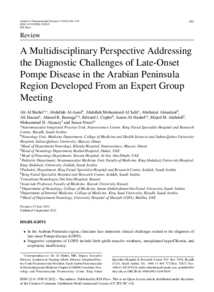Document
A multidisciplinary perspective addressing the diagnostic challenges of late-onset pompe disease in the Arabian Peninsula region developed from an expert group meeting.
Identifier
DOI: 10.3233/JND-220819
Source
Journal of Neuromuscular Diseases. v. 9, 5, p. 661-673
Contributors
Al-Asmi, Abdullah., Author
Al-Salti, Abdullah Mohammed., Author
Almadani, Abubaker., Author
Hassan, Ali., Author
Bamaga, Ahmed K. , Author
Cupler, Edward J. , Author
Al-Hashel, Jasem., Author
Al-Abdali, Majed M. , Author
Al-Anazy, Mohammed H. , Author
Noori, Suzan., Author
Country
Netherlands.
City
Amsterdam
Publisher
IOS Press BV.
Gregorian
2022-06-01
Language
English
Subject
English abstract
Pompe disease is a rare, metabolic, autosomal recessive disorder. Early diagnosis is critical for progressive Pompe disease as delays can significantly alter the clinical course of the disease. Diagnostic modalities, including dried blood spot testing and genetic testing, are available and are effective for diagnosing patients with late-onset Pompe disease (LOPD). However, clinicians face numerous clinical challenges related to the diagnosis of the disease. Two expert group committee meetings, involving 11 experts from the United Arab Emirates, Kuwait, the Kingdom of Saudi Arabia, and Oman, were convened in October 2019 and November 2020 respectively to develop a uniform diagnostic algorithm for the diagnosis of pediatric and adult LOPD in the Arabian Peninsula region. During the first meeting, the specialty-specific clinical presentation of LOPD was defined. During the second meeting, a diagnostic algorithm was developed after a thorough validation of clinical presentation or symptoms, which was performed with the aid of existing literature and expert judgement. A consensus was reached on the diagnostic algorithm for field specialists, such as neurologists, rheumatologists, general practitioners/internal medicine specialists, orthopedic specialists, and pulmonologists. This specialty-specific diagnostic referral algorithm for pediatric and adult LOPD will guide clinicians in the differential diagnosis of LOPD.
ISSN
2214-3599
Resource URL
Category
Journal articles

